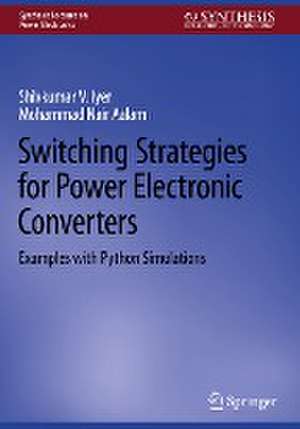Switching Strategies for Power Electronic Converters: Examples with Python Simulations: Synthesis Lectures on Power Electronics
Autor Shivkumar V. Iyer, Mohammad Nair Aalamen Limba Engleză Hardback – 13 oct 2023
Din seria Synthesis Lectures on Power Electronics
- 15%
 Preț: 523.07 lei
Preț: 523.07 lei -
 Preț: 379.82 lei
Preț: 379.82 lei -
 Preț: 381.29 lei
Preț: 381.29 lei -
 Preț: 191.31 lei
Preț: 191.31 lei -
 Preț: 158.28 lei
Preț: 158.28 lei -
 Preț: 247.72 lei
Preț: 247.72 lei -
 Preț: 234.87 lei
Preț: 234.87 lei -
 Preț: 234.87 lei
Preț: 234.87 lei -
 Preț: 206.29 lei
Preț: 206.29 lei -
 Preț: 206.84 lei
Preț: 206.84 lei -
 Preț: 488.12 lei
Preț: 488.12 lei -
 Preț: 447.24 lei
Preț: 447.24 lei -
 Preț: 455.71 lei
Preț: 455.71 lei -
 Preț: 259.41 lei
Preț: 259.41 lei -
 Preț: 359.88 lei
Preț: 359.88 lei
Preț: 372.11 lei
Nou
Puncte Express: 558
Preț estimativ în valută:
71.23€ • 77.39$ • 59.87£
71.23€ • 77.39$ • 59.87£
Carte tipărită la comandă
Livrare economică 16-22 aprilie
Preluare comenzi: 021 569.72.76
Specificații
ISBN-13: 9783031414046
ISBN-10: 3031414047
Pagini: 209
Ilustrații: XII, 209 p. 115 illus., 57 illus. in color.
Dimensiuni: 168 x 240 mm
Greutate: 0.57 kg
Ediția:1st ed. 2024
Editura: Springer Nature Switzerland
Colecția Springer
Seria Synthesis Lectures on Power Electronics
Locul publicării:Cham, Switzerland
ISBN-10: 3031414047
Pagini: 209
Ilustrații: XII, 209 p. 115 illus., 57 illus. in color.
Dimensiuni: 168 x 240 mm
Greutate: 0.57 kg
Ediția:1st ed. 2024
Editura: Springer Nature Switzerland
Colecția Springer
Seria Synthesis Lectures on Power Electronics
Locul publicării:Cham, Switzerland
Cuprins
Introduction.- The Concept of Modulation.- Coordinated modulation strategies - converters with two controllable power devices.- Full Bridge Converter.- Three-Phase Converter.- Multi-level Converters.- Conclusions.
Notă biografică
Shivkumar Iyer is the creator of the free and open source circuit simulator Python Power Electronics. He completed his Bachelors, Master’s and PhD in Electrical Engineering specializing in the field of power electronics. Subsequent to his PhD, he worked for five years in R&D positions in the power industry in India and Canada. He has published prolifically in international journals and conferences besides also being the author of three books “Simulating Nonlinear Circuits using Python Power Electronics”, “Digital Filter Design using Python for Power Engineering Applications” and “Modeling and Python Simulation of Magnetics for Power Electronics Applications” published with Springer International in 2018, 2020 and 2022 respectively.
Shivkumar Iyer is now an independent researcher and educator. He has five online courses on MOOC platforms such as Udemy and Decibels Lab on using Python programming for electrical engineering. His courses have over four thousand students enrolled from over 110 countries in the world and some of the courses have been designated as “Bestseller” courses in the category of electrical engineering. These online courses are video courses with presentations and code-along sessions. The objective of his teaching and research are to provide universally accessible education to aspiring engineers all over the world using open source computing tools such as Python.
Mohammad Nair Aalam received his Bachelor’s in Electrical Engineering from the University of Jammu, India in 2018. He later went on to complete his Master’s in Electrical Power System Management from Jamia Millia Islamia, India in 2021. Subsequently, he worked as a Junior Research Fellow with the Department of Electrical Engineering, Indian Institute of Technology Hyderabad. He is currently pursuing his PhD in Electrical Engineering at the Centre for Power Electronics Systems at the Virginia Polytechnic Institute and State University (Virginia Tech). His research interests are in the areas of High-Density Power Converters, Digital Control of Power Electronics Systems, and Renewable Power Control.
Shivkumar Iyer is now an independent researcher and educator. He has five online courses on MOOC platforms such as Udemy and Decibels Lab on using Python programming for electrical engineering. His courses have over four thousand students enrolled from over 110 countries in the world and some of the courses have been designated as “Bestseller” courses in the category of electrical engineering. These online courses are video courses with presentations and code-along sessions. The objective of his teaching and research are to provide universally accessible education to aspiring engineers all over the world using open source computing tools such as Python.
Mohammad Nair Aalam received his Bachelor’s in Electrical Engineering from the University of Jammu, India in 2018. He later went on to complete his Master’s in Electrical Power System Management from Jamia Millia Islamia, India in 2021. Subsequently, he worked as a Junior Research Fellow with the Department of Electrical Engineering, Indian Institute of Technology Hyderabad. He is currently pursuing his PhD in Electrical Engineering at the Centre for Power Electronics Systems at the Virginia Polytechnic Institute and State University (Virginia Tech). His research interests are in the areas of High-Density Power Converters, Digital Control of Power Electronics Systems, and Renewable Power Control.
Textul de pe ultima copertă
This book provides a concise introduction to switching strategies for power electronics. It provides an in-depth examination of this one concept giving a newcomer a complete immersive experience which has both the depth that is needed to gain confidence yet is simple to understand. The authors examine the basic operation of power electronic systems from scratch and with the help of simulations, how these systems can be constructed. The approach used treats power electronics similar to puzzles and rather than merely presenting them and describing how they work, explore why they came to have the construction they have, and how they could potentially be modified. The authors make extensive use of simulations, with every theory and every result accompanied by a simulation. All simulations are performed by the free and open source Python programming language and the free and open source circuit simulator Python Power Electronics.
Caracteristici
Offers a valuable, stand-alone reference for newcomers to power electronics Presents various viewpoints on power converters, using discussions and logic rather than merely mathematical analysis Provides simulations for every theory, converter and concept, using open source Python and Python Power Electronics
